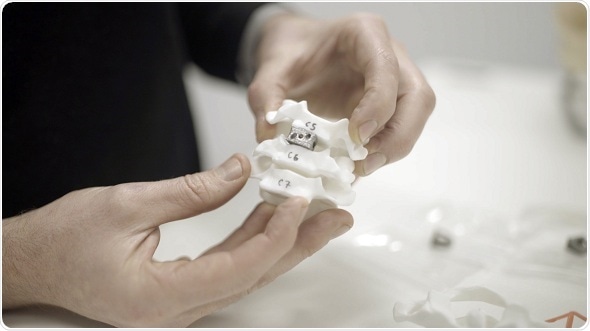Global engineering company Renishaw has collaborated with two advanced technology companies to demonstrate the advantages of additive manufacturing (AM) in the production of spinal implants. By working with Irish Manufacturing Research (IMR) and nTopology, the project shows how streamlined the transition from design to AM can be when working with the right partners.

Spinal implant in model
Manufacturing research organisation IMR designed a representative titanium spinal implant, aimed at the cervical spine (c spine), using advanced manufacturing software company nTopology’s generative design software. IMR then manufactured the implants using Renishaw’s RenAM 500M metal AM system.
AM can be used to manufacture spinal implants with lattice structures, which cannot be achieved with conventional manufacturing techniques. An implant with a lattice structure is lightweight, can be optimised to meet the required loading conditions and has a greater surface area, which can aid osseointegration. Therefore, AM implants can be designed to mimic the mechanical properties of bone, resulting in better patient outcomes. But all of this comes to nothing if you do not have the tools to create the design.”
Ed Littlewood, Marketing Manager of Renishaw’s Medical and Dental Products Division
Traditional CAD tools weren’t built to design complex lattice structures; the job would be difficult or even impossible. Topology was designed to complement existing workflows and make the job easier. We cut the design time of complex structures from days to minutes which was a crucial component in helping this project run to schedule.”
Matt Rohr, nTopology’s Application Engineering Manager
Renishaw worked tirelessly with us on improving the AM process for producing the spinal implants. Together, we designed a set of experiments that yield the most appropriate parameter settings for the product. As a result, we reduced the amount of post processing required on key features of the implants by a factor of ten.”
Sean McConnell, Senior Research Engineer at IMR
Patients with medical conditions including degenerative disc disease, herniated disc, spondylolisthesis, spinal stenosis and osteoporosis can require spinal implants to restore intervertebral height. The improved implant design made possible by AM means patients may require shorter surgery time and fewer revision surgeries, saving healthcare resources and costs.
Renishaw also uses its AM machines to produce healthcare products, such as craniomaxillofacial implants and dental frameworks, at its site in Miskin, South Wales.